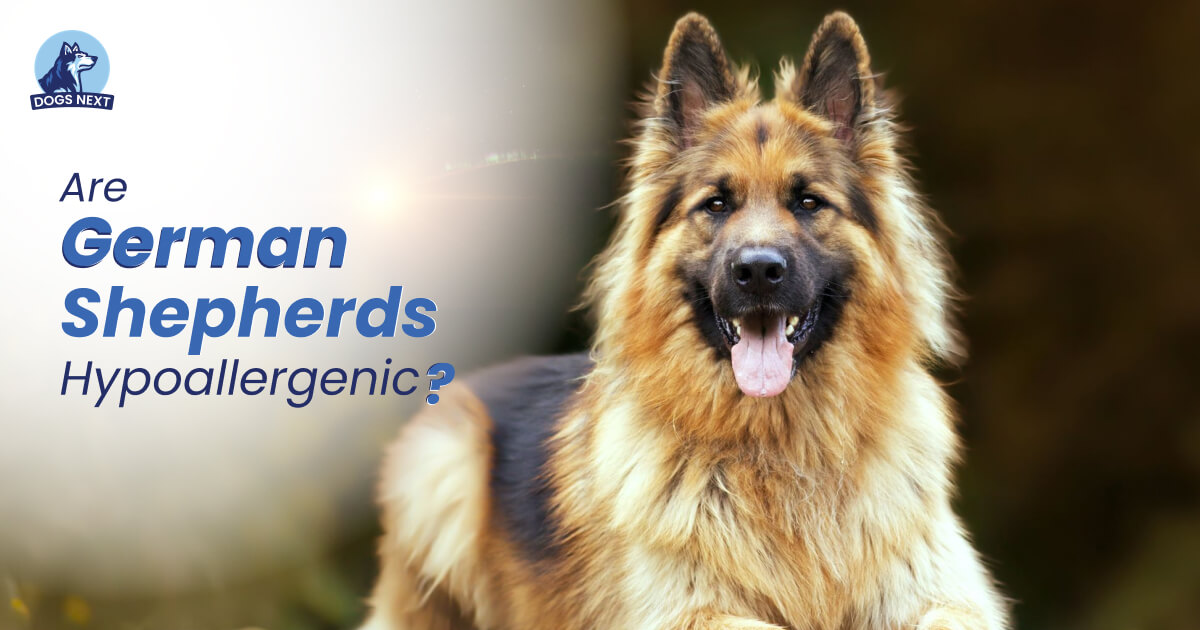No, German Shepherds are not hypoallergenic. They shed heavily and produce dander that can trigger allergies.
German Shepherds are a popular breed known for their intelligence, loyalty, and versatility. These dogs excel in various roles, including police work, search and rescue, and as family pets. Despite their many positive attributes, German Shepherds are not suitable for people with allergies.
They have a thick double coat that sheds throughout the year, producing significant amounts of dander. Regular grooming and cleaning can help manage the shedding, but it won’t eliminate the allergens entirely. Potential owners with allergies should consider other breeds that are more hypoallergenic. Proper research and possibly spending time with a German Shepherd before adopting can help determine if this breed is a good fit.
Demystifying Hypoallergenic Dogs
Are German Shepherds hypoallergenic? Many pet lovers ask this question. To understand, we must first demystify hypoallergenic dogs. This term often confuses potential pet owners. Let’s clear up the myths and get to the facts.
What Does Hypoallergenic Mean?
Hypoallergenic refers to pets that are less likely to cause allergic reactions. These dogs produce fewer allergens. Allergens are proteins found in dog dander, saliva, and urine. Less shedding means fewer allergens in the air.
Are There Truly Hypoallergenic Dogs?
No dog is 100% hypoallergenic. All dogs produce some allergens. Some breeds shed less, reducing allergen spread. This makes them more suitable for allergy sufferers.
Common Hypoallergenic Dog Breeds
| Breed | Shedding Level | Size |
|---|---|---|
| Poodle | Low | Small to Medium |
| Bichon Frise | Low | Small |
| Schnauzer | Low | Small to Large |
Why German Shepherds Are Not Hypoallergenic
German Shepherds are not hypoallergenic. They shed a lot, especially during the shedding season. This increases the amount of dander in the home. People with allergies might find this problematic.
There are ways to manage allergies if you own a German Shepherd:
- Regular grooming and baths reduce dander.
- Use air purifiers to remove allergens from the air.
- Keep your home clean and vacuum often.
- Limit the dog’s access to bedrooms and upholstered furniture.
These steps can help reduce allergy symptoms.
German Shepherd Characteristics
German Shepherds are known for their intelligence, loyalty, and versatility. But are German Shepherds hypoallergenic?
To understand this, let’s explore their characteristics. German Shepherds possess unique traits that affect their allergen production. This includes their coat, dander production, and saliva. Understanding these elements helps determine their hypoallergenic status.
Coat And Shedding
German Shepherds have a double coat. The outer coat is dense and straight, while the undercoat is soft. This combination provides insulation and protection. However, their coat sheds throughout the year, with increased shedding during seasonal changes.
- Year-round shedding: German Shepherds shed consistently.
- Seasonal shedding: They shed more in spring and fall.
Regular grooming is essential to manage their shedding. Brushing their coat several times a week helps reduce loose fur and dander. Investing in a high-quality vacuum cleaner can also help keep your home clean.
| Grooming Tips | Frequency |
|---|---|
| Brushing | 3-4 times a week |
| Bathing | Once a month |
| Professional grooming | Every 6-8 weeks |
Dander Production
Dander consists of tiny skin flakes that animals shed. German Shepherds produce a significant amount of dander. These particles can trigger allergies in sensitive individuals. Dander is one of the primary allergens found in dogs.
To manage dander production, consider the following tips:
- Frequent grooming: Regular brushing helps remove dander.
- Bathing: Use hypoallergenic shampoos to reduce dander.
- Air purifiers: Use air purifiers with HEPA filters to capture dander particles.
- Cleaning: Vacuum your home regularly to remove dander.
Implementing these measures can help mitigate dander-related allergies. Consistency is key to maintaining a low-dander environment.
Saliva And Allergies
Saliva is another source of allergens. German Shepherds, like all dogs, produce saliva. Proteins in their saliva can cause allergic reactions. These proteins can stick to their fur and skin, spreading allergens.
Here are some tips to manage saliva-related allergies:
- Regular cleaning: Wash your hands after petting your dog.
- Avoid face contact: Do not let your dog lick your face.
- Wipe down: Use pet-safe wipes to clean their fur.
Using these strategies can help reduce saliva-related allergens. Awareness and regular cleaning can make a significant difference.
Are German Shepherds Hypoallergenic?
Many people love German Shepherds for their intelligence and loyalty. But one common question arises: Are German Shepherds hypoallergenic? This question is vital for those who suffer from allergies but still want to enjoy the company of this amazing breed. To answer this, we need to understand how German Shepherds impact allergies and what you can do to minimize allergic reactions.
Impact On Allergies
German Shepherds are not hypoallergenic. They shed a lot, which means they release more dander into the air. Dander is the main cause of pet-related allergies. Let’s take a closer look at how German Shepherds can impact allergies:
- Shedding: German Shepherds are known for their heavy shedding. They have a double coat that sheds year-round, with more intense shedding during spring and fall.
- Dander: The shedding fur carries dander, which is tiny particles of skin. These particles trigger allergic reactions in sensitive people.
- Saliva and Urine: Allergens can also be found in the saliva and urine of German Shepherds. When they groom themselves or have an accident, these allergens spread.
To better understand the shedding and dander levels, here’s a comparison table:
| Aspect | German Shepherds | Hypoallergenic Breeds |
|---|---|---|
| Shedding | Heavy | Minimal to None |
| Dander Levels | High | Low |
Dealing with allergies can be challenging, but there are ways to manage it:
- Regular Grooming: Brush your German Shepherd daily to reduce shedding and dander.
- Frequent Cleaning: Clean your home often, especially vacuuming and dusting, to remove dander.
- HEPA Filters: Use HEPA air purifiers to trap allergens in the air.
- Bathing: Bathe your dog regularly to remove loose fur and dander.
- Allergy Medications: Consult your doctor about allergy medications to reduce symptoms.
Understanding the impact on allergies helps potential dog owners make informed decisions. While German Shepherds are not hypoallergenic, proper care can help manage allergic reactions.
Managing Allergies With A German Shepherd
Are German Shepherds hypoallergenic? Unfortunately, they are not. German Shepherds have a double coat and shed heavily, which can trigger allergies. Managing allergies with a German Shepherd can be challenging but not impossible. With the right strategies, you can still enjoy the companionship of this loyal breed while minimizing allergic reactions.
Living With German Shepherds And Allergies
German Shepherds shed a lot, which can release allergens into your home. Living with German Shepherds and allergies requires some planning and effort. Here are some tips to help manage your allergies while living with a German Shepherd:
- Regular Grooming: Brush your German Shepherd’s coat daily to reduce shedding and remove loose hair.
- Frequent Baths: Bathe your dog every 4-6 weeks to minimize dander.
- Vacuum Often: Use a vacuum with a HEPA filter to capture pet dander and hair.
- Air Purifiers: Place air purifiers in common areas to reduce allergens in the air.
- Wash Bedding: Clean your dog’s bedding and your linens regularly to remove allergens.
- Designated Dog Areas: Keep your German Shepherd out of bedrooms and other areas where you spend a lot of time.
- Allergy Medications: Consider using over-the-counter or prescription allergy medications to manage symptoms.
Below is a simple table to summarize these tips:
| Tip | Frequency |
|---|---|
| Regular Grooming | Daily |
| Frequent Baths | Every 4-6 weeks |
| Vacuum Often | Weekly |
| Air Purifiers | Constant |
| Wash Bedding | Weekly |
| Designated Dog Areas | Always |
| Allergy Medications | As Needed |
Regular grooming and bathing are crucial. They help in reducing the amount of dander. Vacuuming and using air purifiers will keep your home cleaner and minimize allergens. Washing bedding and keeping designated dog areas will also help you manage your allergies better. Allergy medications can provide additional relief.
Tips For Potential Owners With Allergies
German Shepherds are loyal and intelligent dogs. But are they hypoallergenic? For those with allergies, owning a German Shepherd can be challenging. Here are some tips to help potential owners with allergies manage their symptoms.
Minimize Exposure To Allergens
Reduce your contact with pet dander. Regular grooming and bathing can help. Use a pet-friendly shampoo to clean your German Shepherd. Brush their coat outside to keep allergens out of your home.
Maintain A Clean Living Space
Keep your home clean. Vacuum carpets and furniture regularly. Use a vacuum with a HEPA filter. Mop floors often to pick up loose hair and dander. Wash your dog’s bedding and toys frequently.
Create Allergen-free Zones
Designate certain areas of your home as dog-free. Keep your bedroom off-limits to your German Shepherd. This can help reduce allergens where you sleep. Consider using air purifiers in these areas to keep the air clean.
Consider Allergy Medication
Consult your doctor about allergy medications. Antihistamines can help manage symptoms. Nasal sprays and eye drops may also provide relief. Always follow your doctor’s advice and dosage instructions.
Regular Veterinary Check-ups
Ensure your German Shepherd has regular vet visits. A healthy dog sheds less. Regular health check-ups can prevent skin conditions that increase shedding. Keeping your dog healthy can help reduce allergen exposure.
Hypoallergenic Products
Use hypoallergenic products in your home. Choose hypoallergenic dog food and treats. These can reduce skin irritations and shedding. Look for hypoallergenic cleaning products for your home.
| Tip | Action |
|---|---|
| Minimize Exposure | Regular grooming, outdoor brushing |
| Clean Living Space | Vacuum, mop, wash bedding |
| Allergen-Free Zones | Dog-free rooms, air purifiers |
| Allergy Medication | Consult doctor, antihistamines |
| Vet Check-Ups | Regular visits, prevent skin conditions |
| Hypoallergenic Products | Hypoallergenic food, cleaning products |
Alternative Hypoallergenic Breeds
German Shepherds are known for their intelligence, loyalty, and versatility. Unfortunately, they are not hypoallergenic. People with allergies may experience issues around German Shepherds due to their shedding and dander. But don’t worry! Several hypoallergenic breeds can be excellent alternatives for those who suffer from allergies. Let’s explore some of these amazing breeds.
1. Poodle
Poodles are available in three sizes: toy, miniature, and standard. They have curly coats that shed minimally, making them a great choice for allergy sufferers.
- Intelligent and easy to train
- Active and need regular exercise
- Friendly and good with children
2. Bichon Frise
The Bichon Frise has a soft, curly coat that doesn’t shed much. They are small, cheerful, and great for families.
| Characteristic | Details |
|---|---|
| Size | Small |
| Temperament | Playful and affectionate |
| Exercise Needs | Moderate |
3. Portuguese Water Dog
The Portuguese Water Dog has a curly, non-shedding coat. They are energetic, intelligent, and love water activities.
- Medium-sized and sturdy
- Great for active families
- Needs mental and physical stimulation
4. Shih Tzu
Shih Tzus have long, flowing coats that do not shed much. They are affectionate and good-natured, making them excellent companions.
- Small and adaptable to apartment living
- Loves attention and cuddling
- Requires regular grooming
5. Labradoodle
The Labradoodle is a cross between a Labrador Retriever and a Poodle. They often have hypoallergenic coats. They are friendly, energetic, and great for families.
| Characteristic | Details |
|---|---|
| Size | Varies (depends on Poodle parent size) |
| Temperament | Friendly and social |
| Exercise Needs | High |
Frequently Asked Questions
Are German Shepherds Ok For People With Allergies?
German Shepherds can trigger allergies in some people. They shed a lot and produce dander, which may cause allergic reactions. Regular grooming and cleaning can help manage allergens. Consult an allergist before getting one.
What Dog Is 100% Hypoallergenic?
No dog is 100% hypoallergenic. Some breeds, like Poodles and Bichon Frises, are less likely to cause allergies.
Is German Shepherd Hair Hypoallergenic?
German Shepherd hair is not hypoallergenic. They shed heavily and produce dander, which can trigger allergies. Regular grooming helps manage shedding.
Is There A German Shepherd Mix That Is Hypoallergenic?
No, there is no hypoallergenic German Shepherd mix. German Shepherds shed heavily, which can trigger allergies. Regular grooming helps reduce allergens.
Conclusion
While German Shepherds are not hypoallergenic, they can still be wonderful companions. Regular grooming and cleaning can help reduce allergens. Consider consulting an allergist before bringing one home. Each individual’s reaction to allergens varies, so careful planning is essential. With proper care, many allergy sufferers can still enjoy life with a German Shepherd.




